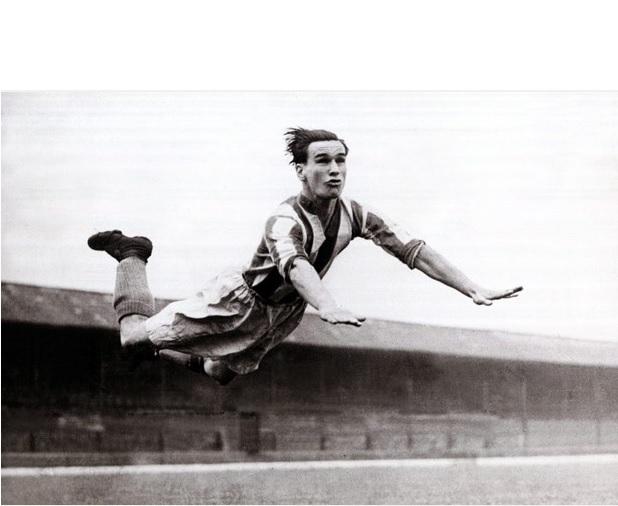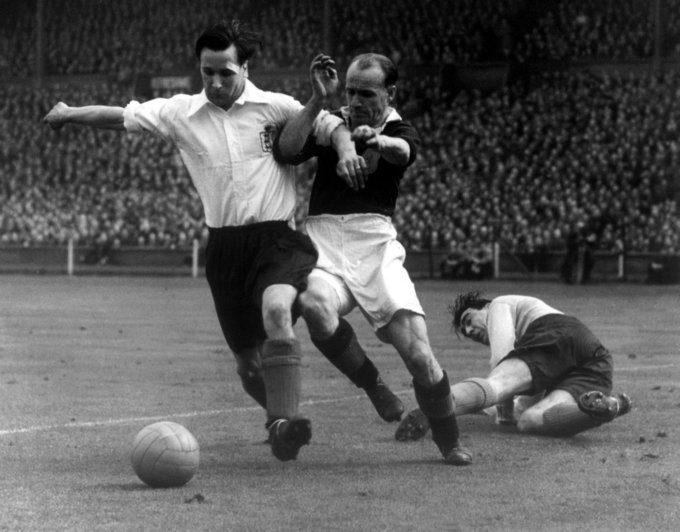Neil Franklin is arguably England’s greatest ever defender. Sir Tom Finney described him as “the best centre-half I ever played with or against”, yet his career in the top flight and with the England national team lasted just over four years. Born in 1922, Franklin lost the early years of his career to the war, but was still only 23 when post-war football resumed. He immediately became a crucial part of the Stoke team, becoming club captain and the stand-out player alongside Sir Stanley Matthews, and rewarded with his first England cap in 1945. Regarded as England’s best defender, Franklin shockingly turned England down for the 1950 World Cup and joined Independiente Santa Fe in Colombia. He was labelled a mercenary and returned disgraced in a matter of months.
Born in Shelton, Staffordshire, on the 24th of January 1922, Franklin joined Stoke’s junior club, ‘Stoke Old Boys’ as a child and his natural ability was quickly acknowledged. At just 15 he won schoolboy international honours, playing as a right-back and in 1939, aged 17, he signed professionally for Stoke City. Despite his age, Franklin was handed his debut in the 1939/40 season, but only managed a handful of games before war broke out and the football league was suspended. He volunteered for the Royal Air Force, where he was based in Blackpool and able to continue playing football regularly and even made 10 appearances for England in wartime internationals.
When the war finally came to a halt, Franklin had altered his position, becoming a centre-half, where he could be more dominant at the back. Although best remembered for his tackling prowess, Franklin also set himself apart from his peers in terms of his ability on the ball. More Beckenbauer than Butcher, the young centre-half liked to carry the ball out from the back and was happy to take men on and look to play intricate passes. At a time when defenders were supposed to defend and not a lot more, Franklin’s style seemed alien to some, including his own teammates. Stoke goalkeeper Dennis Herod said of him, “If he was under pressure he would shout to me Dennis, come on and I would come out expecting him to give me the ball. Nine times out of ten he would do a u-turn and trot off up the field.”
In Stoke’s first full post-war season of 1946/47, Franklin was made the club’s captain. With Stanley Matthews and Freddie Steele in their attacking ranks and Franklin at the heart of defence, Stoke made a real push for the title. They went into their final game against Sheffield United knowing they needed to win, but lost 2-1, dropping down to fourth and finishing two points behind champions Liverpool. But as Matthews headed to Blackpool, the team began a steady decline. Like Matthews, Franklin soon fell out with manager Bob McGrory, who stripped him of the club captaincy. By 1949, Franklin had made his intentions clear to the board that he wanted to leave Stoke.
The same year, second division Hull City made a bid of £30,000 for the defender, which would have made him the most expensive player in world football at that time. Stoke rejected the offer and insisted Franklin signed a new deal, but when, in 1950, he won a £250 bet, Franklin had the insurance to decline the contract. With the 1950 World Cup approaching, and Franklin one of the countries star players, he made the astonishing announcement that he would not be playing in the competition. Franklin claimed his wife’s pregnancy and the imminent birth of their child was the reason for the decision, but weeks later, he flew to Bogotá where he signed for Independiente Santa Fe.
Like all top players in England at the time, Franklin was being paid the maximum wage of £12 a week during the season, £10 a week in the summer, with a £2 win bonus, £1 draw bonus and £20 for every England cap. A number of players grew frustrated with the harsh system and Franklin once told friend and teammate Tom Finney, “You know, Tom, we are at the top of the tree and club’s are taking a fortune off people who want to see us play. We should be getting more of that money. It’s a scandal.” In 1950, when Franklin moved to Colombia, he began to play football in one of very few countries without a wage cap. At Santa Fe, Franklin was given a £3,400 sign-on fee, £170 per game and free accommodation. His sign-on fee alone was roughly the equivalent of what he would earn in 4 years at home.
Expelled by FIFA, Colombia had no reason to follow international laws and quickly began recruiting stars from around the world. These ‘rebel players’ were condemned by the footballing authorities and banned by FIFA. Walter Winterbottom tried to prevent Franklin from joining Santa Fe, but to no avail. Each team in Colombia built a team around a core of star players from a certain region, and Santa Fe picked Britain. They signed cup-winner Charlie Mitten of Manchester United, Billy Higgins of Everton, Bobby Flavell of Hearts and Franklin’s Stoke teammate George Mountford. Upon arrival, Franklin declared “We’ll live finer than any footballers in the world!”
Franklin lasted just six matches. Mitten lasted a single season and Mountford a few months. The players had traveled to Colombia with little knowledge of South American football or the unstable political landscape of the country. The players families felt unsafe and with a 6:30 p.m. curfew, any chance of a social life proved difficult. The promised sign-on fee was never handed over, and Franklin, who had spent two months in Colombia, was only ever paid one weeks wages. All the players returned to England disgraced and no wealthier. Franklin was banned by the FA for 4 months and Mitten was suspended by Sir Matt Busby for 6 months. Speaking of the move many years later, Franklin told the local media, “It was a mistake, of course, and I was certainly made to pay for it.”
Stoke made it clear that they had no interest in taking Franklin back on and no other top flight club would touch him, nor would the national team. In 1951, he joined Hull City for £22,500. Despite his failed Colombian adventure, the transfer to East Yorkshire still made Franklin the most expensive defender in the world. At Boothferry Park he joined up with Raich Carter, who knew him well from their time together in the England squad. Franklin’s class was there for all to see, along with player/manager Carter, the two were head and shoulders above not only the rest of the Hull City squad but also the rest of the second division.
Despite flirting with promotion to the First Division, the Tigers never made it a reality, and Franklin was plagued by injuries. A particularly nasty knee ligament injury effectively ended his career, and despite playing regularly for Crewe between 1956 and 1957, he was a shadow of the man who had racked up 27 England caps in just 4 years and proved himself to be the finest defender of a generation. Moves to Stockport, Macclesfield and Wellington Town further emphasised his fall from grace, but keen to stay in the game, Franklin moved into management. Firstly with Wellington, and then a season with Cypriot champions APOEL, where he finished in seventh place. When civil war broke out in Cyprus, Franklin returned to England, managing Colchester for four years, being sacked with one promotion and one relegation to his name.
Had it not been for Franklin’s disastrous Colombian adventure, who knows what he could have achieved. England’s most distinguished footballers of the time hold greater praise for Franklin than almost any other player. Matthews reserved particular praise for Franklin in his autobiography, describing him far more poetically than I ever could, writing “Neil won everything in the air, tackled with superb timing and when the ball was at his feet possessed the nous to pass it with all the guile and intelligence of the most cerebral of inside-forwards. An erect physique belied tremendous mobility and breathtaking speed over four or five yards.”
Along with his teammates, Franklin himself was well aware of him immense ability. Dennis Herod also commented that, “He didn’t believe he could have a bad game and was the only one who didn’t suffer with nerves.” Without Franklin, England went through a series of inferior defenders and had a disastrous World Cup in 1950, even losing to the part-timers of the U.S.A. Tom Finney commented that “He was still good enough to play for England, though. It was very sad”. Whilst Billy Wright said, “He would have played for England for at least another four years, and I often wonder what difference that would have made to my own career.” After his sacking at Colchester, Franklin ran a pub in Oswaldtwistle, Lancaster. He died in February 1996, aged 74, in Stoke-on-Trent.
Update: Following the overwhelming reaction to this piece, I have written a book about Neil Franklin. To find out more, you can visit the official website here.



Great read, thanks.
LikeLike
Great Read and insight!
LikeLike
Excellent article – thoroughly enjoyed reading it.
LikeLike
Great read. Well written!
LikeLike
As a (6 day week) school boy m’dad took me to watch and see – What an event – truant, match, meat pie stoke with Dad.. Now 80 most of my life in BC the memory is so easily recalled… A great story well written.
LikeLike
I never saw Franklin play too young, but those who did say he was the greatest defender ever, and that Billy Wright would never have had a look in for the England centre half position !!!
LikeLike
Thank you for this biography my mother said he was her cousin , born a Plant, I was also a centre half ,when my dad whatch me he always mentioned that Franklin didn,t get his shorts dirty!!
LikeLike